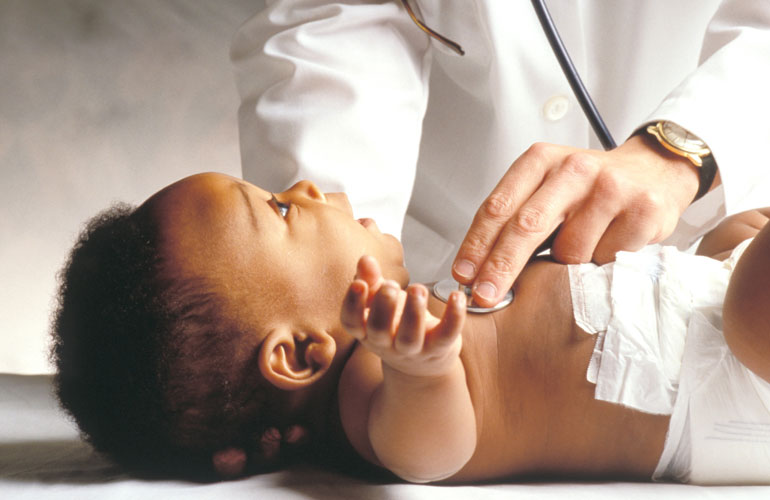I’m sitting in the pediatrician’s waiting room, feeling pretty good, pretty darn proud of the fact that I’ve got the best-behaved kid in the room. Well, okay, so she’s asleep. But she looks like such an angel when she sleeps. I’m staring at her, as a mother will do, believing all is right with the world.
Then I feel a thwack above my right ear, a plastic Big Bird hitting me in the head. “Justin!” a woman shouts. “Don’t throw your toys!” And Justin, who appears to be about 2, looks at his mother, as if waiting for her to say something more.
“Thank you,” she says. Moments later, when Justin turns with a smile to reveal a green crayon wedged up his nose, Justin’s mother’s says, “Justin! Take that crayon out of your nose!” And when Justin does, his mother says, “Thank you.”
[Instant eBook: Adopting a Newborn in the U.S.]
Why is Justin’s mother thanking him? This puzzles me, and I hear echoes of friends saying the same thing to their kids after correcting them. I’m not sure when thanking kids for doing the right thing started. I don’t remember my mother thanking me for not beating up my sister for a whole week. As a disciplinarian, my mother was more just the “No!” and “Because I said so!” type.
Sitting here with my sleeping Anna, I wonder what kind of disciplinarian I’ll be, and realize I have no idea. Shouldn’t I have opinions?
Thank goodness Anna is only 12 months old. Because I have time to figure some of this stuff out. Because she really doesn’t do anything bad yet, aside from maybe that time she ate that daffodil and I had to call Poison Control. So I’m just not going to worry about this yet, I think, and pick up a parenting magazine.
I flip to an article about highchair manners and setting limits. “If you let your baby drop food on the floor,” the author says, “you have missed a learning opportunity for self-control, and this could result in slower intellectual growth.”
[Bonding and Attachment Basics for You and Your Child]
Yikes.
But Anna gets such a kick out of watching the cat that sits there waiting for that dropped food. As he grabs it up she just roars with laughter, which is certainly not what I value more than intellectual growth. But, well, it is funny
Okay, now the baby in the stroller next to Anna is squirming and whining. She wants the sippy cup perched on her mother’s knee, but her mother isn’t handing it over. Instead, Mom is pointing at her chin, then running her finger down her throat. She is making this motion over and over again, until the baby’s face starts turning red with frustration.
“Looks like baby’s thirsty!” I say, finally, in my chirpiest just-trying-to-help voice.
“Thirsty,” Mom says, repeating her finger motion. “She can do it. She did it this morning.” Mom says she’s teaching her daughter baby sign language. “You know, they’re ready to communicate long before they can form words,” she says, explaining that if you let your kid whine now, you end up with a whiny toddler, a whiny adolescent and on and on. “You’re supposed to nip that behavior in the bud,” she says.
I thought a 12-month-old was in a sort of pre-bud stage.
“Oh, no,” she says. And she tells me about “credit-card parenting.” She says, “If you don’t start now, you pay the training price in the future, but with compounded interest.”
[Setting Appropriate Behavioral Expectations]
I look at my daughter, the snoozing angel. I look at her and I think: Help! I’m sitting here building up a huge debt on my parental charge card.
By the time it’s my turn with the pediatrician, I’m a nervous wreck. The doctor asks what’s wrong. I tell her: “I’m having discipline issues.” She asks what’s the problem? I say, “I don’t know, but Anna does drop food off her highchair, and am I supposed to thank her for napping, for eating her peas, for not blowing up the house?”
The doctor has no idea what I’m talking about, but she’s a compassionate woman, lets me dump all my fears about ruining my child. When I’m finished she says here’s what to do: Take a long walk with Anna, followed by a picnic in the grass with our shoes off, wiggling our toes. “Enjoy your daughter,” she says. “If you want to build confidence as a mother.”
I should write this down and remember to tell Anna. It’s almost always good to go back to what you were doing before you got all mixed up.
This article was originally published in the Washington Post Magazine.



